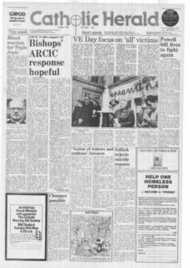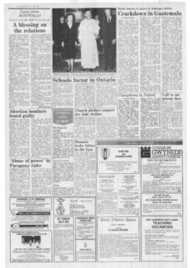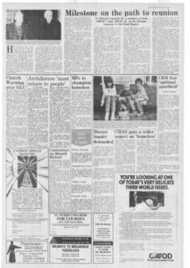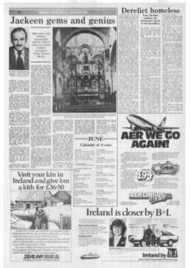Page 1, 10th May 1985
Page 1
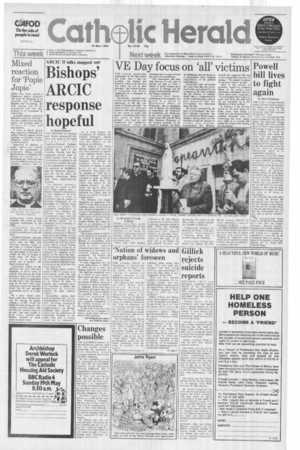
Report an error
Noticed an error on this page?If you've noticed an error in this article please click here to report it.
Tags
Share
Related articles
Breaches In The Anglican Walls
A Year Of Unity And Division
Bishop Intransigent On Women
Us Bishops Praise Arcic
Milestone On The Path To Reunion
ARCIC; II talks mapped out
Bishops' ARCIC response hopeful
by Kasia Giedroyc THE BISHOPS of England and Wales announced this week that much of the Final Report of the Anglican/Roman Catholic Commission (ARCIC) affirms the faith of the Catholic Church, but they suggested several areas in which further work by the Commission is needed to aid ecumenism, notably the issue of the ordination of women, the question of infallibility and the universal primacy, and the way in which the dogmas concerning Mary have been authoritatively defined.
The • Bishops' statement, approved last month at their Low Week meeting after a lengthy process of consultation, is their response to the Final Report and is made in accordance with the request of Cardinal Willebrands of the Secretariat of Christian Unity. in Rome. It praises the outstanding achievements of ARCIC and pledges the Bishops' support for the Commission's future work but also points out anything which the Bishops consider "to be inadequate in its treatment or expression".
Bishop Alan Clark of East Anglia, Chairman of the Bishops' Department of Mission and Unity and Bishop Cormac Murphy O'Connor of Arundel and Brighton, Chairman of the Committee for Christian Unity, joined Bishop Francis Thomas of Northampton, Chairman of the Theology Commission which prepared the response, at the launch of the report last week. Bishop Thomas emphasised that the reservations expressed in the report should be interpreted not as rejections but as pointers for future discussion.
The Bishops clearly attribute much of ARCIC's success to its methodology, which they sum up in the words of the present Pope: "Your method has been to go behind the habit of thought and expression born and nourished in enmity and controversy to scrutinise together the great common treasure."
Nevertheless, despite their acknowledgement that "in our understanding of the Word of God, differing theological expressions often can be complementary", the Bishops emphasise their concern "to ensure that the relationship of authorative formulae to the truths they seek to convey should not be weakened."
In its Final Report, the Commission of Anglican and Catholic theologians claimed "substantial agreement" on the first two subjects of the Eucharist and Ministry.
The English and Welsh Bishops endorse that claim but they draw attention to specific issues requiring further study, such as the question of reservation and adoration of the Eucharist, and indicate the problems created by thel ordination of women in some parts of the Anglican Communion. They suggest that the question of "who can or cannot be ordained" cannot be separated as easily as ARCIC appears to think from "the origin and nature of the ordained ministry". In other words, the way in which the ministerial priesthood was instituted by Christ, and its nature, are vital to the issue of women priests.
The Bishops also found themselves in agreement with ARCIC on the vexed question of Anglican orders, saying that the issue should be explored in the context of developments in both Anglican and Catholic thinking on the nature of the Church and the ordained ministry. They wonder whether this might not lead to a resolution of the present situation by "or agreed act of convalidation or reconciliation".
The progress made by ARCIC on the question of Authority in the Church is hailed by the Bishops as outstanding, even though the Commission did not claim to have reached substantial agreement; there was disagreement on the nature of a universal primacy and its jurisdiction. The Bishops see grounds here for substantial agreement in the future.
In their suggestions for the future deliberations of ARCIC II, which has yet to meet, the Bishops underline the need for "the Anglican evangelical voice to be heard to great effect." This echoes the fears expressed by some people that the agreements of ARCIC cannot be accepted by a significant number of Anglicans. These have been highlighted particularly since the controversy over Prince Charles not attending Mass in Rome, which has ocassioned the expression of opposition by some Anglican evangelicals to the Catholic doctrines of the Mass and the priesthood.
As they look to the future the Bishops call for a dialogue of prayer, social action and study between all Christians.
see leading article, page 4 and Analysis, page 3
blog comments powered by Disqus


